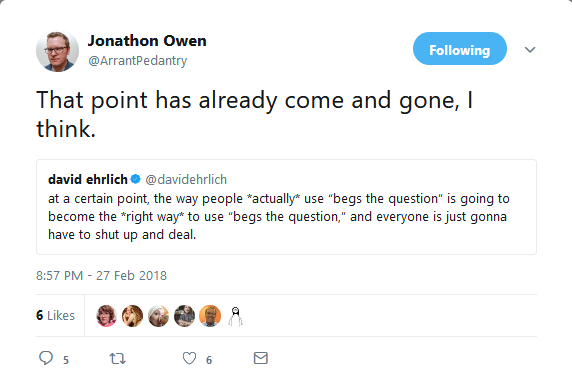The Economist finally comes around
From Lane Greene at The Economist, "The ban on split infinitives is an idea whose time never came," with boldfacing by yours truly:
GEORGE BERNARD SHAW was once so angry with a subeditor that he complained to the newspaper. “I ask you, sir,” Shaw wrote, “to put this man out.” The cause of his fury? The editor had insisted on “correcting” split infinitives. “Set him adrift and try an intelligent Newfoundland dog in his place,” Shaw fulminated, “without interfering with his perfect freedom of choice between ‘to suddenly go’, ‘to go suddenly’ and ‘suddenly to go’.”
This spring a new edition of The Economist’s style guide is published*. Many of its changes are of a kind only a copy-editor would notice; but on an issue that has set teeth grinding for centuries, it marks a sea-change that Shaw would have appreciated. It says infinitives may be split.
While this strikes a blow for linguistic sanity, it is not an unmixed blessing. The Economist's prohibition of split infinitives within its pages has provided a steady supply of topics for blogospheric descriptivists (especially those with the initials "GKP"), who will now have to find something else to write about.
Economist still chicken: botches sentence rather than split infinitive (Geoff Pullum on Language Log)
No-excuses split infinitive in the Economist (Geoff Pullum on Language Log)
To more than justify the split infinitive (Geoff Pullum on Language Log)
At last, a split infinitive in The Economist (Geoff Pullum on Language Log)
Economist Sticklers trying to bug me (Geoff Pullum on Language Log)
Active seeming: dumb grammar fetishism yet again (Geoff Pullum on Language Log)
Rules that Eat Your Brain (Geoff Pullum on Lingua Franca)
The Economist Should Lighten Up and Split Some Infinitives (Geoff Pullum on Slate)
Led astray by the no-split-infinitives fetish (Gabe Doyle on Motivated Grammar)
To offensively split infinitives (Stan Carey on Sentence First)
